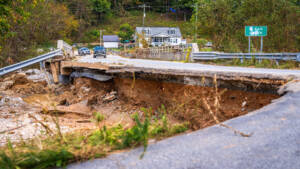AFBF Economist Calculates Potential Hurricane Milton Damage
Daniel Munch
Economist
Chad Smith
Associate News Service Editor, NAFB

photo credit: AFBF Photo, Big Foot Media
Daniel Munch
Economist
Chad Smith
Associate News Service Editor, NAFB
The American Farm Bureau Federation has put together calculations for the production value most at risk of damage from Hurricane Milton. Chad Smith has more on the devastation.
Smith: Two weeks after Hurricane Helene battered Florida’s Big Bend region, Hurricane Milton made landfall, further devastating the state’s agricultural sector. Farm Bureau economist Danny Munch says a combination of data allows us to assess potential damage based on production value in the region.
Munch: What we found was that vegetable production is the largest agricultural sector in those counties impacted by Hurricane Milton, with a total value exceeding $1.6 billion produced in those counties. FDA requires and restricts any sales of edible portions of crops that have been exposed to flooding, so any vegetables that were flooded have been lost. The fruit and tree nuts sector, where the next largest sector, $1.3 billion in ag sales in those affected counties are produced, such as the state’s citrus industry.
Smith: The estimated losses don’t stop there.
Munch: Florida is also the second-largest producer of strawberries in the U.S., producing over $430 million in strawberries each year, and 99 percent of the acreage was in the counties within Hurricane Milton's path. You also had wind damage on barns and infrastructure, cutting power to dairies and aquaculture facilities in the area, and damaged fencing and livestock containment areas.
Smith: The road to recovery will be long for Florida’s agricultural community, but Munch says there is help available.
Munch: So, when we're talking about crop insurance providers, approved insurance providers, they've been authorized to accept delayed notices of losses due to Hurricane Milton. FSA has provided some flexibilities. You also have some permanent disaster programs in the farm bill that will continue to help, such as the Tree Assistance Program, which provides vital financial support to cover the cost of replanting or rehabilitating orchards when those trees are damaged or destroyed. Then, the Livestock Indemnity Program, which compensates livestock losses exceeding normal mortality due to extreme weather. So, those are just a few of the programs farmers can use.
Smith: Chad Smith, Washington.
What We're Saying

Economic Conditions and Natural Disasters Mean Farmers Need Relief
Nov 7, 2024
READ MORE

Calculating Hurricane Helene’s Damage
Oct 8, 2024
READ MORE

Hurricane Helene Devastates Rural Southeast
Oct 8, 2024
READ MORE

CNBC: Why Orange Juice Futures Hit Records and Prices May Even Go Higher
Jul 31, 2024
READ MORE
Trending Topics
VIEW ALL